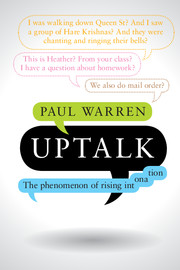Book contents
- Frontmatter
- Dedication
- Contents
- List of figures
- List of tables
- Preface
- Acknowledgements
- List of symbols and abbreviations
- 1 Introduction – why ‘uptalk’?
- 2 The forms of uptalk
- 3 The meanings and functions of uptalk
- 4 Uptalk in English varieties
- 5 Origins and spread of uptalk
- 6 Social and stylistic variation in uptalk use
- 7 Credibility killer and conversational anthrax: uptalk in the media
- 8 Perception studies of uptalk
- 9 Uptalk in other languages
- 10 Methodology in uptalk research
- 11 Summary and prospect
- References
- Index
10 - Methodology in uptalk research
Published online by Cambridge University Press: 05 December 2015
- Frontmatter
- Dedication
- Contents
- List of figures
- List of tables
- Preface
- Acknowledgements
- List of symbols and abbreviations
- 1 Introduction – why ‘uptalk’?
- 2 The forms of uptalk
- 3 The meanings and functions of uptalk
- 4 Uptalk in English varieties
- 5 Origins and spread of uptalk
- 6 Social and stylistic variation in uptalk use
- 7 Credibility killer and conversational anthrax: uptalk in the media
- 8 Perception studies of uptalk
- 9 Uptalk in other languages
- 10 Methodology in uptalk research
- 11 Summary and prospect
- References
- Index
Summary
The various studies of uptalk reviewed or summarised in this book illustrate the complexities of the forms, functions and distributions of this type of rising intonation. What is perhaps less clear is that the study of uptalk has involved a range of researchers, including sociolinguists, discourse analysts, phoneticians and intonational phonologists. Not surprisingly, the reported research includes a number of different methodological approaches. This chapter summarises some of the main methodological issues. The purpose is twofold. First, an understanding of variation in methods is crucially important for our understanding of any differences we find in the conclusions drawn about uptalk. Second, it is to be hoped that an awareness of these considerations will be of use to future researchers wishing to investigate this intonational pattern. Issues to be discussed include the way in which speech data are collected (including the use of speech corpora and the selection of the speaking or listening tasks given to informants) and the types of analysis made of the speech data.
Language samples
Early reports of uptalk have tended to be anecdotal. That is, observers have noted examples of rising intonation in what seem to them to be surprising contexts, i.e., at the ends of what would usually be understood to be declarative statements. For many lay observers (as we saw in Chapter 7), the immediate reaction is to suspect that the speaker had some reason to ask a question, and it is often assumed that this reason relates to uncertainty or insecurity. For the researcher, some important early steps are to explore whether this unexpected use of intonational rises reflects a few isolated cases or is more systematic, and to determine with greater care what meaning or function this intonation pattern might have. These tasks are best supported by a larger dataset than the initial anecdotal observations. While continued informal listening (e.g., to conversations involving speakers suspected of uptalking) may allow more general statements about speaker behaviour, the building of a collection of recordings permits more careful scrutiny of how often and under what circumstances uptalk is produced.
Many of the uptalk studies cited in this book have used spoken language corpora, i.e., collections of speech data that have been put together by researchers.
- Type
- Chapter
- Information
- UptalkThe Phenomenon of Rising Intonation, pp. 171 - 186Publisher: Cambridge University PressPrint publication year: 2016



